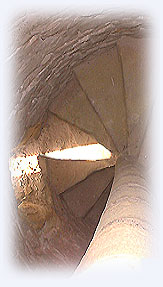The Impact of Violence on Learning
Bad, stupid, wrong, don't belong
When we experience violence we may feel ashamed. We may feel bad, stupid, wrong, or that we simply don’t belong. This may play out in many different ways, but whatever our version looks like, it may make us feel horrible. It may lead us to take everything anyone else does or says personally. We are sure they are agreeing that we are bad, wrong, and don’t belong. This makes it very hard to receive criticism or comments on our work, or even to have our classmates disagree with us or suggest different ways of doing something. We may avoid learning new things so that we can’t fail and don’t have to feel bad as we try.
 Pictures Pictures
Telling ourselves that we are bad, stupid, wrong or that we don’t belong can feel like this...
digital images by: Judy Murphy, Debbie Lifshen, and Jenny Horsman
top of page
 Quotes Quotes
Feeling worthless
The first incidents didn't have an immediate effect on me as I was very young. As the abuse continued, it became harder to deal with. It was in grade three, when I was eight years old, that my life came apart. I started to feel isolated, punished for something I must have done, afraid. and worthless. I moved from a happy childhood. enjoying school and having no unusual problems into isolation, fear, and failing at school. I had been a lively, out-going child who enjoyed being with people.
- - - - - - - - - - - - -
Feeling bad: Bo’s Story
I know now I can speak out about my abuse and how it affected me. I lost all of my self worth, and self esteem, believing I could not make anything of myself.
- - - - - - - - - - - - -
Feeling stupid: Grace Anne's Story
In the last semester of my third year, as I was completing a BA and preparing to take an honours history year, I again experienced a breakdown. I asked for an incomplete in one class and stumbled through the other three; I felt my options for further study and career were pretty much closed. I understood I didn't have the capacity to study consistently--I never knew when depression would disorientate me. I did not speak to anyone about this.
- - - - - - - - - - - - - -
Students Reflect on Feeling “Stupid” ( - 22k) - 22k)
Several women in a research study wrote about feeling stupid. Some saw others judged them as stupid and blamed them for their problems learning. This led to more fear, more failure, and a lasting difficulty believing they could learn.
- - - - - - - - - - - - - -
Exploring School-Induced Shame: Research and Innovative Practice
- Transforming the Shame of Early School Difficulties (
 - 241k) - 241k)
- School-Induced Shame: Research Overview (
 - 63k) - 63k)
- Unmasking School Shame: the Impact on Sense of Self (
 - 325k) - 325k)
- Coping Behaviors and Defending Behavior (
 - 117k) - 117k)
top of page
|




